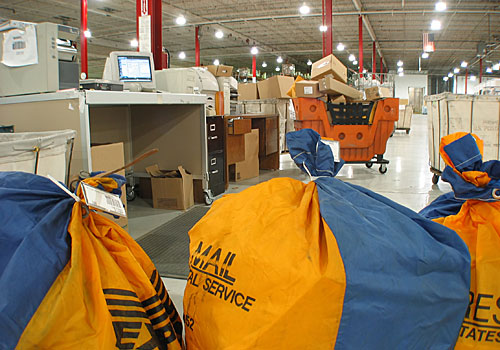
DHL Airways sale may aid purchase of Airborne unit
A U.S. investment group completed the purchase of DHL Airways yesterday, a move company officials hope will ease concerns about the sale of part of Seattle-based Airborne Express to DHL Worldwide.
The group paid $57 million for DHL Airways, which will operate as ASTAR Air Cargo and be based in Miami. The company will be led by DHL Chairman and Chief Executive John Dasburg.
The sale of Airborne's ground-delivery service to DHL Worldwide raised concern with Airborne rivals Federal Express and United Parcel Service, which complained to the U.S. Department of Transportation that a foreign company controlled DHL Airways.
U.S. law prohibits foreign ownership of domestic airlines. Deutsche Post, the German postal service, owns DHL International, which has been a major stakeholder in DHL Airways.
Congress ordered the Transportation Department to review DHL's ownership in April.
Lawyers representing DHL Airways before a federal administrative-law judge had sought a suspension of the review, arguing the sale to the Dasburg group would resolve all questions. But Judge Ronnie Yoder refused to interrupt or dismiss the proceedings. A hearing is set for Aug. 19.
Yoder has ordered DHL to turn over sensitive documents about its operations and the ASTAR sale. Last week, he ruled that the chief executives of Deutsche Post and DHL Worldwide must make themselves available for interviews as part of the review.
The companies plan to appeal that ruling to transportation policy-makers.
Airborne Express, meanwhile, is moving ahead. The Seattle company's shareholders will meet Aug. 14 to decide whether to allow DHL Worldwide to buy Airborne's ground service, according to documents filed Friday with the Securities and Exchange Commission. The deal must be approved by a majority of shareholders.
Airborne's airline component is to be spun off to shareholders as ABX Air.
In its SEC filing, Airborne said DHL Worldwide's purchase would go forward even if U.S. officials find Deutsche Post improperly controls DHL Airways or the airline unit of Airborne. It expects to begin seeking Department of Transportation approval this month to sell ABX and expects DHL's purchase to be completed in the third quarter.
If the purchase is approved, some of Airborne's 1,200 to 1,500 employees could be out of work. Decisions about how to reorganize DHL's enlarged business would be made after the sale closes.
"I can't say there will be a need for all the functions currently being done in our Seattle headquarters," said Richard Corrado, Airborne Express senior vice president of marketing. "We have still to make an assessment of that."
Airborne Chief Executive Carl Donaway would serve as the combined company's chief executive officer.
If the merger is completed, Airborne's top executives and directors will be entitled to receive about $8 million for their stock options, according to the SEC documents filed Friday.
In addition, Donaway and Chief Financial Officer Lanny Michael will received bonuses equal to their 2003 base salaries. Those figures have not been reported, but last year Donaway's base pay was $652,500 and Michael's was $339,807.
Other executives could share up to $500,000 in bonus money.
If all the top executives are let go after the merger, together they would receive about $40 million in severance payments.
Airborne had been in financial trouble since 2000 as revenue decreased and operating expenses grew.
It was looking for investments to help it meet its financial obligations. In 2002, it began talking with Deutsche Post, the privately owned German postal service and DHL's parent company.
The acquisition and merger was announced March 25. Airborne's 425,000 clients would give Brussels-based DHL a secure foothold as the third-largest delivery carrier in the United States, behind FedEx and UPS.
DHL Worldwide Express whose U.S. headquarters is in San Francisco is the market leader in Europe and South America but has only 1.9 percent of the U.S. market, compared with Airborne's 18 percent.
The merger would allow DHL to increase competitive pressure on UPS, which has 53 percent of the market, and FedEx, which has 26 percent.
The combined company would seek to increase its share of the small to mid-sized customer market, Corrado said.
"FedEx and UPS have … a lot of pricing power over consumers," said analyst Peter Jacobs of Wells Fargo Securities. "DHL would present a formidable competitor and would probably put pressure on pricing."












